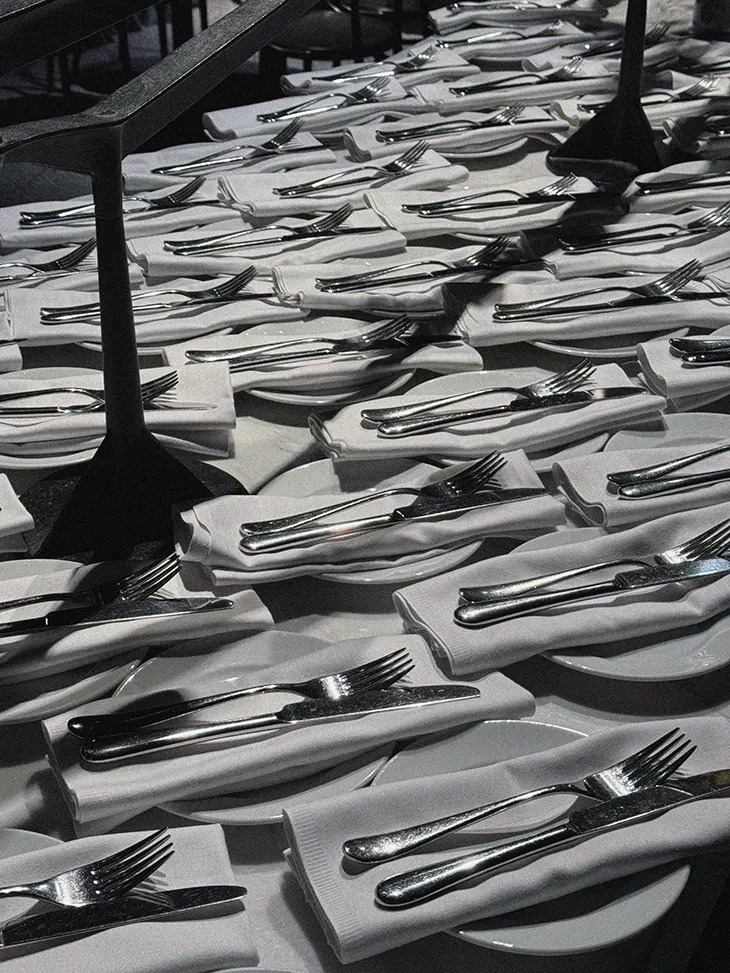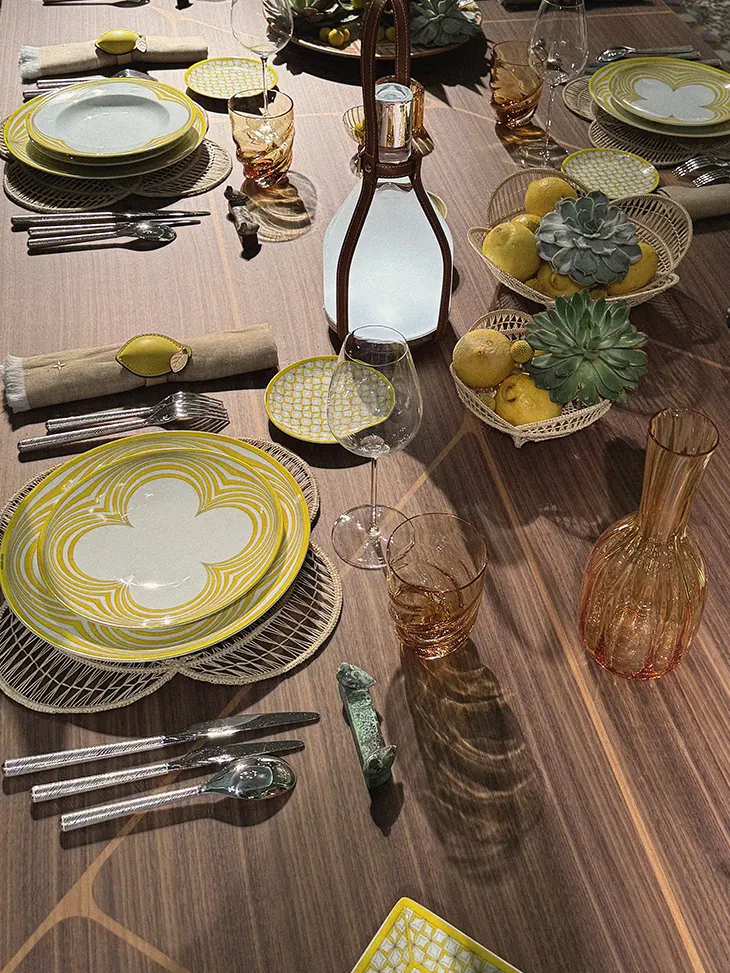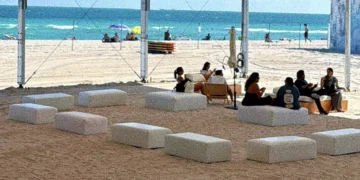
The dinner table has always been political, though it rarely admits it. It looks like a place of nourishment, community, and conversation, but beneath the surface it is a site of performance. Women know this instinctively. To set a table, to cook a meal, to invite people into your home, is never just an act of generosity. It is a test. The table is where design choices, appetite, gender, and class converge, creating a space that pretends to be about eating but is in fact about judgment.
DORIC ORDER
Modern life disguises these pressures with the language of taste. We no longer talk about a good wife or a good hostess. We talk about aesthetic choices. About “intentional design.” About how a dinner party feels. The vocabulary has changed, but the expectation remains. The table is where women are measured by their ability to feed, to curate, to perform control over food and environment in equal measure.

The contemporary dinner table begins long before food arrives. It begins with surfaces, furniture, and the objects placed on them. The table itself must say something about the woman who owns it. A simple IKEA dining set signals youth, transition, or indifference. A heavy oak table implies permanence and taste. A travertine slab lit by softly glowing candles whispers quiet money. The choice of material, shape, and finish is never neutral. Wood suggests authenticity. Marble suggests luxury. Round tables suggest intimacy. Long tables suggest power. We pretend these are private decisions, but the moment a guest sits down, the table begins to speak on our behalf.
Tableware carries its own coded messages. The proliferation of niche ceramics has made it impossible to claim ignorance. The handmade bowl, irregular in glaze, matte instead of glossy, now functions as shorthand for cultivated taste. A stack of plates from Ferm Living or a perfectly weighted glass from R+D Lab tells your guests that you understand restraint and precision. It tells them you care, but not in a desperate way. Even the choice of candle matters. A Diptyque taper signals old-world indulgence. A soy wax pillar from a local maker suggests sustainability and sincerity. The table becomes a catalogue of decisions, each one read as evidence of character.
The table is where design choices, appetite, gender, and class converge, creating a space that pretends to be about eating but is in fact about judgment.
The pressure to perform taste does not end with design. It extends into the kitchen. To be a good host now means being both an interior curator and a cook of competence. You cannot simply order in food, unless it is a rare delicacy sourced with purpose. You are expected to know recipes, to cook seasonally, to demonstrate ease with flavors. A pasta dish must be handmade, but casually so, as though you rolled out dough for fun, not to impress. A salad should contain bitter greens, edible flowers, or something unexpected, but never appear forced. Dessert is optional, though baking communicates a deeper level of care. To fail at cooking is no longer acceptable. It marks you as incomplete.
Hosting has become another branch of self-presentation, one that fuses the visual world of design with the intimate labor of food. Women are taught that they should welcome people into their homes with kindness and an evidence of mastery. A dinner party becomes a performance of competence across categories: design, taste, conversation, appetite. Guests should leave impressed by the ease with which it all happened. The work must appear invisible.

Even rebellion has been co-opted into performance. The so-called messy dinner, with its paper tablecloths scrawled in marker, its food placed directly on parchment, its spilled wine and half-burned candles, is no less curated than a minimalist spread of ceramics and beige linens. The difference is tone. One says: I am polished, composed, elegant. The other says: I am carefree, generous, creative. Both are performances. Both rely on props, staging, and careful control.
The weight of these expectations is rarely acknowledged. Women are supposed to enjoy hosting. To see it as an extension of independence, proof that they have arrived in adulthood. Yet the pressure is relentless. To not host at all is seen as antisocial. To host badly is embarrassing. To host without taste is almost unforgivable. Every element of the dinner table becomes a referendum on worth: the food, the furniture, the lighting, the conversation, even the smell of the apartment when people walk in.
A dinner party becomes a performance of competence across categories: design, taste, conversation, appetite.
The irony is that these rituals often claim the language of feminism. To cook for friends is positioned as empowerment, proof that women can reclaim the kitchen on their own terms. To buy niche ceramics is framed as supporting artisans, not indulging in consumerism. To host a dinner party is celebrated as building community, not performing labor. Yet these acts rarely feel free. They feel like obligations, intensified by social media and the endless scroll of other people’s immaculate tables. The dinner table has become another platform for comparison. You are never simply eating together. You are producing an image of togetherness.
Design culture intensifies this performance. Magazines and websites publish spreads on how to set a table, how to arrange candles, how to balance color palettes in your dishware. The language is always the same: effortless, intentional, authentic. But effortlessness requires enormous labor. Intention requires hours of preparation. Authenticity requires knowledge of trends and access to expensive objects. Women internalize these standards. They light candles, arrange flowers, choose playlists, and hope it all looks natural.

Even the act of sitting down to eat carries politics. Women are judged for their appetites. To eat too little signals vanity or disorder. To eat too much signals indulgence or lack of control. The food on the plate is never just food. It is evidence of discipline, of self-care, of character. Hosting a dinner requires navigating not only your own appetite but the imagined appetites of others. Will the food be too heavy? Too light? Too ambitious? Too simple? Every decision carries risk.
The politics of the dinner table extend far beyond domestic interiors. They echo in the phrase “a seat at the table,” invoked in boardrooms and parliaments, in activism and policy. The table becomes a symbol of power, and women are told to fight for inclusion. Yet inclusion is rarely structural. A seat may be offered, but the menu has already been written. The politics of representation play out in miniature in the dining room: women are invited to host, but the terms of hosting remain fixed. The labor is invisible, the expectations endless.
What would it mean to refuse the performance? To set a table without thought of how it looks on Instagram. To serve food that is nourishing rather than impressive. To allow mismatched plates, cheap glasses, and unevenly cooked pasta. To host without the pretense of mastery. It would mean returning the dinner table to its function: a site of nourishment, community, and exchange, rather than a mirror of personal taste.
Women are rarely granted the space to be ordinary, even at their own tables.
Yet refusal is difficult. In a culture where women are constantly evaluated, to drop performance feels dangerous. Taste is power. A well-set table grants legitimacy. A well-cooked meal affirms competence. To resist is to risk being misread as careless or incomplete. Women are rarely granted the space to be ordinary, even at their own tables.
The politics of the dinner table will not vanish with more niche ceramics or more expensive candles. They will vanish when hosting stops being proof of worth. When food is food, not evidence. When taste is shared rather than performed. When women sit at their own tables without fear of what it communicates. Until then, the dinner table remains political, not because of what is eaten, but because of what is expected.
To clear the table is not enough. We must rewrite what it means to gather around it.




















